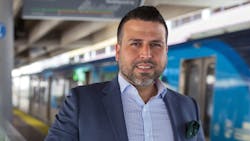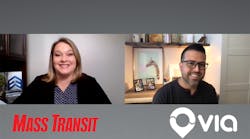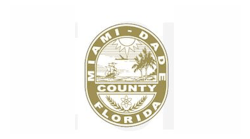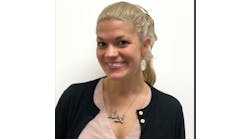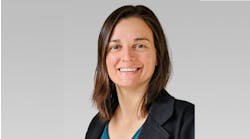One word to describe yourself: Positive.
Alma Mater: Colegio - The University of Puerto Rico, Mayagüez Campus (UPRM) is commonly referred as Colegio.
Favorite station or stop that you frequent (and why): Brickell Station in Miami. A true mobility hub with a convergence of heavy rail, automated people mover, express buses, regional buses, local circulators, eScoters and bikes. In addition, the creation of The Underline has turned this station as a truly walkable haven.
Favorite transit service that you have ever visited (and why): I once rode the Subte Linea A in Buenos Aires, Argentina and loved its nostalgic flair, while Skytrain in Vancouver is the right mix of capacity and technology.
Carlos Cruz-Casas does not let an opportunity pass him by. Whether it’s a chance to experience a community’s needs firsthand, build a new partnership or challenge the status quo, he is prepared to take advantage of those opportunities and affect change for the betterment of the Miami-Dade region. His enthusiasm for transit innovation has delivered improved mobility options, while his leadership and visionary approach is credited with creating a dynamic work environment.
Cruz-Casas has been working on mobility improvements within Miami-Dade County for more than a decade. He began in the private sector as an engineer on a variety of traffic, transit, pedestrian and bicycle projects and his varied background equips him with a holistic approach to mobility. Miami-Dade County Mayor Daniella Levine Cava called Cruz-Casas an innovative thinker who has sought unique partnerships, collaborations and new approaches to the county’s transit system.
As chief transportation manager at the city of Miami, he launched the Miami Trolley (the municipal local circulator), introduced a carshare program and a bikeshare program. At the Miami-Dade County Department of Transportation and Public Works, he led the efforts to adopt the Better Bus Network, which is a network redesign effort to increase frequency of service and create better connections resulting in a significant increase in ridership. Additionally, he had led the creation of Miami-Dade’s Vision Zero program, Miami-Dade’s Shared Mobility Plan, Miami-Dade’s AV Vision Plan, and the Knight Foundation AV Initiative among many others.
The county made several service changes against the backdrop of fluctuating demand and supply during the pandemic with Cruz-Casas leaning into innovative solutions to solve several challenges. He investigated ways to retrofit buses for real-time information to help manage loads and led the efforts to add supplemental contracted service to provide service on high-demand routes that suffered overcrowding due to social distancing requirements.
Cruz-Casas recognizes the value of having many mobility options and is working to expand protected bike lanes in downtown Miami, as well as leverage local micromobility through more access to bicycles, e-bicycles and e-scooters.
To deliver on all these efforts, it takes a motivated team and bringing a group of people together to work toward a common goal is something Cruz-Casas has perfected. Colleagues say he promotes a positive environment where he supports and facilitates their professional intellectual growth.
As one colleague noted, Cruz-Casas is heavily involved with pushing the innovation agenda across the mobility industry. His advocacy is cited as a reason for the annual CoMotion Conference that is held in Miami and brings startups and innovative companies together. He serves on the board of directors at the Open Mobility Foundation, and he speaks regularly around the country on pressing mobility topics.
Is there a specific experience that led you to where you are today?
More like a series of experiences. At a very young age, I was interested in engineering and followed the footsteps of my dad and enrolled for a dual degree in civil engineering and land surveying at the University of Puerto Rico, Mayaguez campus. While pursuing the civil engineering degree, I became interested in a graduate degree in transportation. I was accepted at a few universities. Later I found out that University of Florida (UF) had a strong technical program but was late to apply. My professor and mentor at the University of Puerto Rico asked if I could support the Technology Transfer Center with a presentation on how the center was helping build the transportation workforce. My answer was “yes” and as a token of appreciation, he facilitated for me to go in-person to UF on our way back from Savannah, Ga.
An opportunity was opened, and it was up to me to see it through. I was able to secure a meeting with the graduate program administrators and professors within the transportation program. I remember reading about the program, getting to know their previous work and learning about their background on my plane ride and late at night. Our meeting was on a Tuesday morning, on the following Saturday, I received a letter signed Wednesday that I was accepted into the program.
I learned that day that determination and being prepared for when opportunities arrive was of extreme value. From that point forward, I have taken the same approach for everything I do. Today, 17 years after that leap, I say that all moments count. We often expect for doors to magically open or for opportunities to appear. The truth is that every day is a step closer to meeting our goals. Every day and the dedication that we bring into each day, is what shapes our future.
What do you enjoy most about your job?
The people. It has been fun to work on so many different projects like launching a municipal circulator, launching a bikeshare program, initiating a full bus network redesign, introducing on-demand transit, advancing real-time transit information for passengers, building separated and protected bike lanes, and even applying artificial intelligence to our CCTV cameras for passenger counts. However, there is no doubt that it would’ve not been the same if I wasn’t surrounded by a team of dedicated public sector professionals.
When the opportunity to join Miami-Dade County presented itself, I took on the challenge without hesitation. I joined as it was clear to me that the leadership was dedicated to improving mobility for Miami-Dade County residents. I was fortunate to build a team that matched my enthusiasm and dedication.
Miami-Dade is a special place, the diversity of challenges brings in a diversity of voices. We have strong community voices that resonate through several local advocacy groups and this is something that brings value to the work we do. Getting to work together on projects that have immediate positive impact on the lives of Miami-Dade County residents is equally challenging as it is rewarding.
Lastly, I have learned from our mayor that the best way to predict the future is by creating it. And I am confident that the work we carry on at DTPW plays a big role in creating the city we want to live in.
Accomplishment you’re most proud of and why?
I have worked in variety of projects in both public and private sector and have been successful in introducing mobility innovation to our community in various ways. However, more than shaping a Miami-Dade for future generations, I am most proud of the generations we are raising for Miami-Dade: My two little ones and the unique individuals they have become.
They care about safe mobility in their own way. Lucía, my seven-year-old daughter, likes to create things. She says to build stuff like her dad. The other day we were building a city with Legos and she built a bus stop with a shelter. In her mind, every bus stop should have a shelter. My four-year-old son, Rodrigo, likes to ride fast when we are on the bike and go slow when driving a car through the neighborhood. Plus, he says that electric cars are cool. How awesome is that?!
Of course, I couldn’t have done any of this alone. I have a great partner at home who is our rock. She has been there from the beginning and leads by example.
Best advice/tip/best practice to share from your area of expertise?
I know it has been said several times, however I believe there is no better way to identify the real needs of our cities than to experience it first-hand. Putting ourselves in the shoes of the user is the best way to really understand. And when that is not possible, find ways to elevate the voice of the community. Just recently, we successfully tested a community liaison program with the support of the Knight Foundation where we connected directly with members of the community to be part of the engagement.
And if I may add one more, I would say to be clear and open about the desired outcomes. One of the most innovative projects we have completed is the Better Bus Network where the Transit Alliance Miami, a local transit advocacy group, took the lead for the entire project. While initial conversations were a bit adversarial in nature, we immediately focused on the desired outcome and realized we wanted the same: Improved transit service for Miami-Dade. Let’s keep our focus on outcomes.
